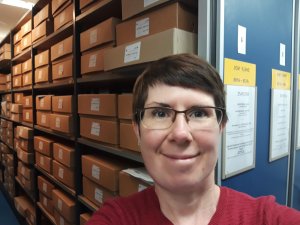I thought I’d start this by telling you a bit about me, I work at the National Oceanographic Library and help staff from the University of Southampton and the National Oceanography Centre with their open access queries and applications to fund their research papers. Luckily, I also get to manage the archives based at NOC which holds a unique collection of scientific data, logbooks, photographs and videos covering the subject of oceanography and deep-sea research. If I’ve piqued your interest you can find out more here – https://www.noc.ac.uk/facilities/national-oceanographic-library/archives-special-collections. In my previous role I was a Cataloguer and catalogued new stock which was purchased for the library.

Each element (open access, archives and cataloguing) requires the inputting of accurate metadata. Metadata in simplest terms is data about data, it provides more information to help describe another piece of data. Such as a catalogue record for a book, the information contained in the catalogue entry describes the book by title, author, publisher, published year, number of pages etc.
So, you might be thinking, is there really metadata associated with open access? The answer is of course, the open access paper alone has so much within it. The data is telling the reader about all kinds of information. Such as author(s) and title, the subject of the paper in the form of keywords, a brief synopsis captured in the abstract, and then not forgetting the research in the body of the paper. There is data indicating what you can do with the paper through Creative Commons licences, and whether you can freely access the paper because it has been published as open access. Then there is the DOI (Digital Object Identifier) a string of letters, numbers and symbols which is unique to the paper and links it to a location on the internet. You can also find within the paper information on any research funding received.
The library on behalf of the University of Southampton reports back to UK Research and Innovation’s (UKRI) and funders who are partners in the Charity Open Access Fund (COAF). We ensure all this data is accurately entered, with key data which is needed within the reporting spreadsheet. We ensure we enter the acceptance and published dates correctly; can you imagine the spreadsheet file for dates displaying in US with m/d/y format instead of the UK d/m/y? It could skew the data. Again, all this data about data which we deal with every day which must be precise and accurately recorded.
When you start processing an archive collection you need to list the material so it can be found and used. This isn’t just found by a customer wanting to access the file, but also found by a member of staff in the archives. You start by sorting the material so it can be boxed up and stored together in smaller collections within the larger collection. Such as a collection which has logbooks, photographs, data print outs, you would put similar items together. Depending on the size of the collection it can take quite a while to sort. At some point, you will then want to list the items (if you haven’t started this already). When you list items in an archive you are creating metadata, as you are describing each item in the box, you then would describe the collection as a whole.
I have simplified each element where we are dealing with metadata, but you can see each step requires you to have attention to detail. Incorrect data can cause issues when reporting back to funding bodies on open access. Or even within the open access paper itself, if a link or an email address is entered incorrectly you may not be able to follow the information or get in touch with the author regarding their data. The same is true within the archives, enter a wrong location and the item could be lost forever in the shelving. Throughout my career (so far) my role has changed quite considerably and the knowledge I require to undertake my role. However, thinking about it, the role is not that different after all, I still deal with metadata, I still require attention to detail and I still sit in front of a computer, and no librarians do no sit around reading all day (we wish!).
If you have any comments or questions, please get in touch via eprints@soton.ac.uk

